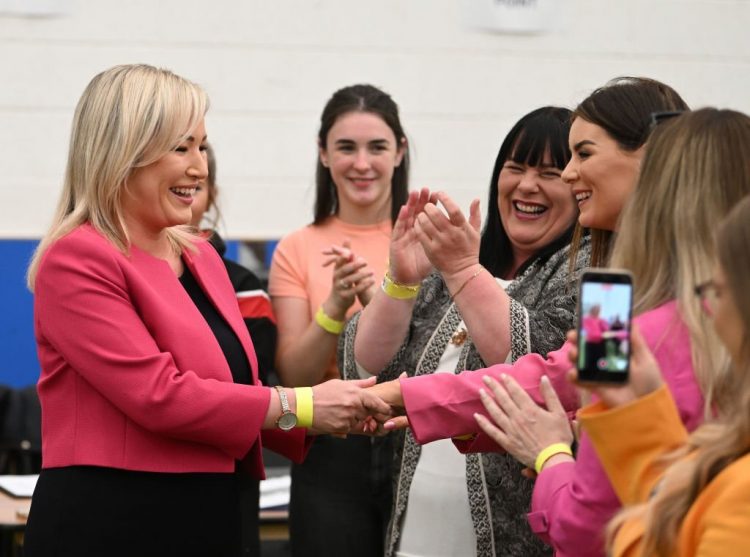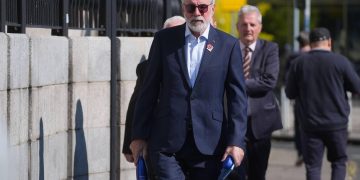Following their success in last year’s parliamentary elections, Sinn Féin, a nationalist party, emerged as the largest party in Northern Ireland’s Legislative Assembly. They have further solidified their presence by achieving significant victories in the recent local elections. Consequently, there has been an upsurge in news and discussions surrounding Irish reunification. One key area of contention revolves around the revival of the Northern Ireland Executive. Could you please elaborate on the specifics of this dispute? Additionally, I would be glad to provide insights into President Biden’s recent visit to Northern Ireland and how it relates to Irish reunification.
Sinn Féin’s vote increase
Sinn Féin won 144 out of 462 seats in Northern Ireland’s municipal councils, which is 39 seats more than the party’s result in the 2019 local elections. Its main rival, the Democratic Unionist Party (DUP), won 122 seats, while the centrist coalition party won 67 seats.
The meaning of Sinn Féin’s victory in the elections
Michelle O’Neill, the deputy leader of Sinn Féin, described the results as a “momentous” achievement. She emphasized that her party’s success is a powerful message to voters, underscoring the urgent need for the paralyzed coalition government in Northern Ireland to return to normal functioning. O’Neill emphasized the election’s significance as an opportunity to convey a clear signal of support for positive leadership and a party committed to restoring the operational status of the Assembly. Furthermore, she highlighted the importance of delivering excellent council services, assisting people grappling with the cost-of-living crisis, and making substantial investments in the health service.
Power-sharing rules in Northern Ireland
Over a year ago, the Democratic Unionist Party (DUP), advocating for Northern Ireland’s continued membership in the UK, decided to withdraw from the semi-autonomous government in Belfast. Their decision was in protest against introducing a customs border between Northern Ireland and the rest of the country during the post-Brexit period. This withdrawal resulted in the suspension of the government. According to the power-sharing provisions outlined in the 1998 Good Friday Agreement, the main pro-British and pro-Irish nationalist parties must collaborate and form a government together.
A Solution to the political impasse in Northern Ireland
O’Neill said the DUP could no longer continue boycotting the legislature. She called on the British and Irish governments to work together to help resolve the political deadlock in Northern Ireland. She said: “To support the positive leadership and a party that wants to get the Assembly up and running, deliver first class council services, support people with the cost-of-living crisis, and invest in the health service.”
Biden’s Request for political reconciliation in Northern Ireland
Northern Ireland politics have been locked in a long-running dispute over customs checkpoints introduced following UK’s exit from the European trade bloc in 2020. During his visit to Belfast, the capital of Northern Ireland, the US President called for political reconciliation of all parties in the region and emphasized the importance of the interest of lasting peace. But he faced severe criticism from radical parties favouring integration with the UK.
Biden hopes to restore the Northern Ireland executive.
In part of his speech at the University of Ulster, Joe Biden said, “It will underscore the readiness of the United States to preserve those gains and support Northern Ireland’s vast economic potential to the benefit of all communities.” He asked all regional political parties to revive the coalition government based on power sharing, suspended since February last year. The US President emphasized the increase in investment and economic opportunities over the past 25 years and after the signing of the Good Friday Agreement, which was implemented with the mediation of the then US government under President Bill Clinton.
Biden’s Purpose for Visiting Northern Ireland
During this trip, Biden met with British Prime Minister Rishi Sunak and leaders of all local parties in Northern Ireland. The US president said the primary purpose of his four-day visit to Ireland was to maintain peace in Northern Ireland. But senior officials in the Democratic Unionist Party took an undiplomatic tone about Biden, favouring preserving and strengthening Northern Ireland’s integration with the UK and under pressure to return to a coalition government.
The positions of the Democratic Unionist Party against Biden
Sammy Wilson, a representative of this party in the British House of Commons, called Mr Biden “anti-British” and added that Mr Biden, who is the second Catholic president in the history of the US, “If you believe that there should be a special relationship between the US and the UK, then at least show us some respect.” In an interview with the Daily Telegraph newspaper, Nigel Dodds, another party’s lawmaker, said mediation efforts would not succeed. He added: “Pressure from an American administration which is so transparently pro-nationalist constitutes no pressure on us at all.”
No change in political equations in Northern Ireland after Biden’s visit
Jeffrey Donaldson, leader of the Democratic Unionist Party (DUP), expressed his appreciation for Mr Biden’s visit and statements. However, he also highlighted that the political dynamics in Northern Ireland have remained unchanged. Donaldson urged the UK government to take further actions to safeguard the region’s unique position within the broader British context. The power-sharing arrangement between Northern Ireland’s nationalists and unionists is an important accomplishment of the Good Friday Agreement, which ended decades of violence in the region. Unfortunately, this coalition government has faced paralysis since February of the previous year due to the unionists’ opposition to the special economic agreement for Northern Ireland in the context of Brexit.
Concerns of the Democratic Unionist Party
The Democratic Unionist Party (DUP) is concerned that the special economic deal will deepen the divide between the Northern Ireland region and the rest of the UK, benefiting nationalists whose ultimate goal is to join the Irish Republic. Due to the opposition of this party, the new agreement signed between the UK and the EU about two months ago to facilitate trade in Northern Ireland has yet to be debated in the local Assembly. Despite all these problems, the White House said Mr Biden’s visit to Northern Ireland was a sign of tremendous progress since the signing of the Good Friday Agreement in 1998.
The sensitive political situation in Northern Ireland
Northern Ireland is the only part of the UK that shares a border with a member of the EU, Ireland. This border has been very sensitive due to the history of sectarian violence in Ireland, and the UK and the EU agreed to keep this border free of customs posts and other inspections to respect the Northern Ireland peace process. Instead, customs checks were introduced for goods entering Northern Ireland from the rest of the UK. This has angered the Democratic Unionist Party, which believes the checkpoints undermine Northern Ireland’s place in the UK.





























